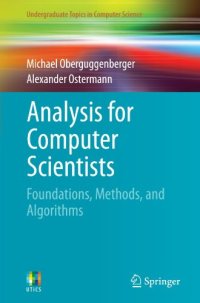
Ebook: Analysis for Computer Scientists: Foundations, Methods, and Algorithms
- Tags: Math Applications in Computer Science, Computational Mathematics and Numerical Analysis, Appl.Mathematics/Computational Methods of Engineering, Discrete Mathematics in Computer Science
- Series: Undergraduate Topics in Computer Science
- Year: 2011
- Publisher: Springer-Verlag London
- Edition: 1
- Language: English
- pdf
Mathematics and mathematical modelling are of central importance in computer science, and therefore it is vital that computer scientists are aware of the latest concepts and techniques.
This concise and easy-to-read textbook/reference presents an algorithmic approach to mathematical analysis, with a focus on modelling and on the applications of analysis. Fully integrating mathematical software into the text as an important component of analysis, the book makes thorough use of examples and explanations using MATLAB, Maple, and Java applets. Mathematical theory is described alongside the basic concepts and methods of numerical analysis, supported by computer experiments and programming exercises, and an extensive use of figure illustrations.
Topics and features:
- Thoroughly describes the essential concepts of analysis, covering real and complex numbers, trigonometry, sequences and series, functions, derivatives and antiderivatives, definite integrals and double integrals, and curves
- Provides summaries and exercises in each chapter, as well as computer experiments
- Discusses important applications and advanced topics, such as fractals and L-systems, numerical integration, linear regression, and differential equations
- Presents tools from vector and matrix algebra in the appendices, together with further information on continuity
- Includes definitions, propositions and examples throughout the text, together with a list of relevant textbooks and references for further reading
- Supplementary software can be downloaded from the book’s webpage at www.springer.com
This textbook is essential for undergraduate students in Computer Science. Written to specifically address the needs of computer scientists and researchers, it will also serve professionals looking to bolster their knowledge in such fundamentals extremely well.
Dr. Michael Oberguggenberger is a professor in the Department of Civil Engineering Sciences at the University of Innsbruck, Austria. Dr. Alexander Ostermann is a professor in the Department of Mathematics at the University of Innsbruck, Austria.
This textbook presents an algorithmic approach to mathematical analysis, with a focus on modelling and on the applications of analysis. Fully integrating mathematical software into the text as an important component of analysis, the book makes thorough use of examples and explanations using MATLAB, Maple, and Java applets. Mathematical theory is described alongside the basic concepts and methods of numerical analysis, supported by computer experiments and programming exercises, and an extensive use of figure illustrations. Features: thoroughly describes the essential concepts of analysis; provides summaries and exercises in each chapter, as well as computer experiments; discusses important applications and advanced topics; presents tools from vector and matrix algebra in the appendices, together with further information on continuity; includes definitions, propositions and examples throughout the text; supplementary software can be downloaded from the book’s webpage.